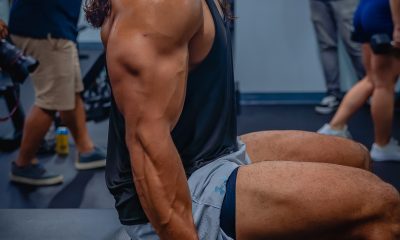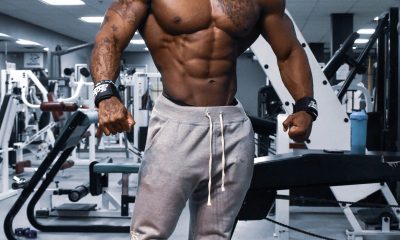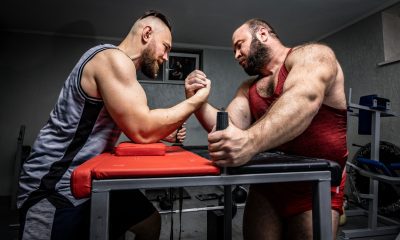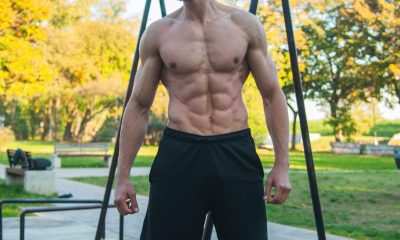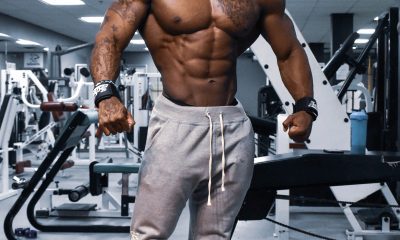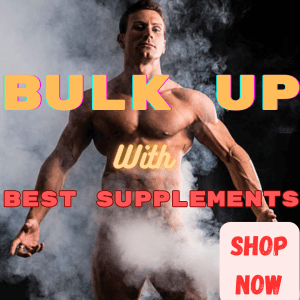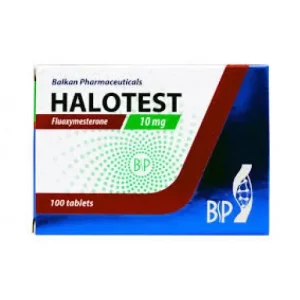Steroids
The History Of Steroid Use By Athletes
For as long as there have been athletes there have been steroids. Steroids provide a means of getting a leg up over the competition and pushing your body and your abilities to the max during training and on game day. While steroids haven’t always received the most positive support and attention from sports leagues and media outlets, its influence on the history of sports and ability to turn an ordinary athlete into the extraordinary cannot be denied.
Steroids weren’t always the science they are today and they have come a long way from unpredictable results and questionable safety to precision enhancement drugs with little to no long-term negative effects. It’s a fascinating lesson in sports history for any modern day athlete to understand how far steroids have come.
Steroids from Basic Beginnings

The earliest signs of performance-enhancing drug use stem from the ancient Olympic Games in Ancient Greece around 776 BC. Because the athletes in the games competed for great prizes and rewards and were considered to be equivalent to our modern day celebrities there was a lot of pressure put on winning.
A win wasn’t just for the individual but for the honor of a family, or even district. These ancient Olympians experimented with a variety of doping methods. One of the most popular was opium juice. Because opium contains a small percentage of natural morphine it was known as the strongest pain medication available during that time.
The pain minimizing effects probably allowed for athletes to put their body through greater strain all the while feeling little physical repercussions. Along with opium, athletes also mixed wine with various roots and herbs. Though the meat wasn’t a common staple of an average ancient Grecian’s diet, many athletes of the time took part in eating mass amounts of meat or other animal parts like the heart or even testicles.
These parts were said to increase power in an individual. Though not based in science, it’s most likely that sudden mass meat consumption boosted testosterone production and really did give an extra boost of the drive to the consumer. Because ancient civilizations were highly involved in the competition, whether through city growth, wars or entertainment all of these methods were considered perfectly legal.
Must Read: Best Steroid Cycles For Beginners
Steroids in the Middle Ages:

During this time period warfare entertainment was at the height of its popularity, these sports included anything with heavy bloodsheds like gladiator matches, jousting, sword fighting and the like. Because of these sports, it was even more important to be a strong competitor as any loss meant you could be facing death.
Athletes learned to use hallucinogens to combat their fatigue, the most common being strychnine, which is currently used to kill pests and rodents. Hallucinogens allowed the competitor to be in a dazed state which can actually improve the focus of the athlete and make them stronger opponents by being harder to knock down.
Must Read: More Middle-Aged Men Taking Steroids to Look Younger
The Beginning of Modern Day Steroid Use:

The discovery of the coca leaf at the end of the 19th century lead to the beginning of modern day drug use. The coca leaf is the plant that cocaine is derived from and during those times was a very popular recreational drug much like alcohol nowadays.
The coca leaf was often mixed with wine, or taken as the rudimentary form of cocaine we know how to battle fatigue and fight back hunger. Professional athletes were becoming more prevalent with modern day athletic competitions on the rise.
This meant that athletes who performed on an as-needed basis now had to actually train their bodies to stay ahead of the game and they supplemented their training with steroid use. Sports teams would dope together to boost their practices and workouts.
The 20th Century to Today:
With steroid use in full swing athletes were pushing their bodies to tolerate higher and higher combinations of lethal drugs like heroin, strychnine, and cocaine. It was so common that many teams had their own compounds or “secret formulas” they thought to be the most effective.
But the more athletes pushed themselves, the more their bodies started to shut down, killing themselves by their own ambition. In 1928 The International Association of Athletes Federation (IAAF) became the first to ban the use of steroids out of concern for the athletes.
While steroids started being produced and distributed commercially, even going so far as to be handed out to troops in the field, more athletic associations banned them to prevent abuse and overdose. Starting in the 1960’s drug testing became the norm across the board for all athletes and competitors, including horses in major races.
Non medically prescribed steroids are now banned by all major competition associations and are illegal in many countries. Use of steroids found in competing athletes can not only get an athlete disqualified from a specific competition but can ban them from all future competitions and even strip them of their past titles (Lance Armstrong is the best example of this).
Testing for steroid use has become an incredibly advanced science with new tests being developed constantly. Steroid testing has become such a controversial issue that it is now referred out of associations and is contracted out by actual labs that not only complete tests before competitions but also save specimens for a period of years to be tested for future allegations of doping or as new tests are developed.
Though steroid overuse can cause damage to the system, many consider the laws banning steroids to be too dramatic. In safe doses, steroids can be highly effective enhancement tools and help an athlete reach great heights in his or her field.
With all enhancements and drugs there are two sides to every story and removing the stigma of steroids and instead of teaching people how to use them safely and effectively there’s no telling what humans can push their bodies to do. The history of steroid use while flooded with bad examples of athletes who have abused drugs to cheat the competition, also has a long history of showing what humans can achieve with enhancements.
Must Read: 5 Best Steroid Cycles for 2018
Steroids
Creatine vs Myostatin: An Expert’s Analysis
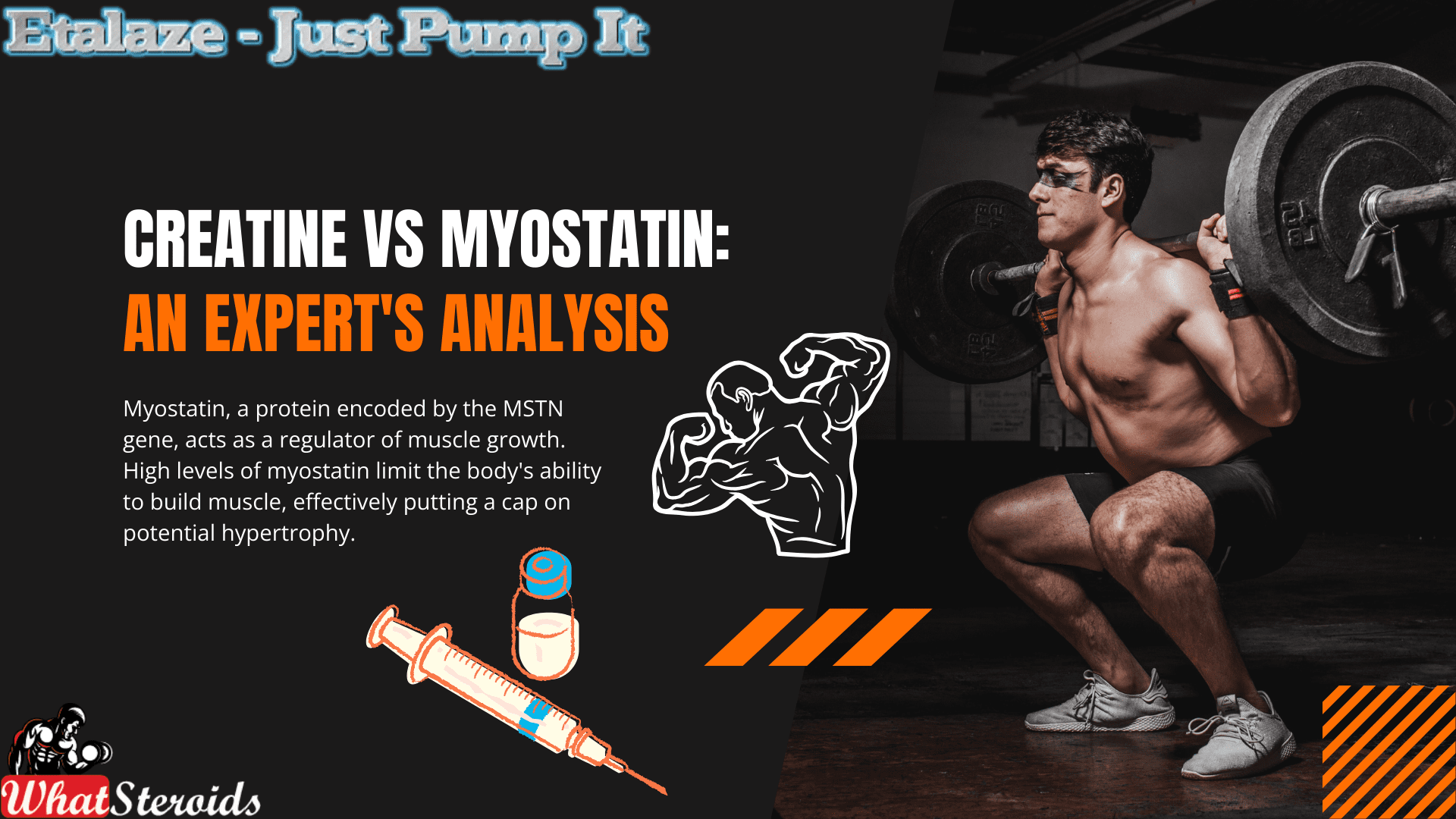
Myostatin, a protein encoded by the MSTN gene, acts as a regulator of muscle growth. High levels of myostatin limit the body's ability to build muscle, effectively putting a cap on potential hypertrophy. Inhibiting myostatin has become a focal point for bodybuilders looking to break through plateaus and achieve significant muscle gains. The question is: can creatine, a popular and widely available supplement, help in this regard?
Medical History of Myostatin and Creatine
Myostatin and creatine, while popular now in the bodybuilding world, have their roots in entirely different contexts:
Myostatin: Natural Muscle Growth Regulator
Myostatin is a protein originally identified for its role in regulating skeletal muscle mass. In nature, it serves an evolutionary purpose: by limiting muscle growth, it conserves energy, ensuring that animals (and humans) don’t expend unnecessary resources maintaining excessive muscle tissue. This was especially important in the wild, where energy efficiency could mean the difference between survival and extinction.
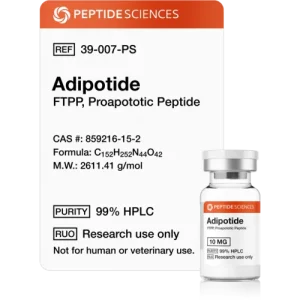 Check Adipotide (FTPP) 10mg by Peptide Science
Check Adipotide (FTPP) 10mg by Peptide Science
In the medical field, research into myostatin has focused on its role in muscle-wasting diseases. Scientists are exploring ways to inhibit myostatin to treat conditions like muscular dystrophy, where excessive muscle loss impairs quality of life. This therapeutic potential is where the idea of myostatin inhibition first began—long before bodybuilders latched onto the concept.
Creatine: Energy and Medical Applications
Creatine was originally studied for its role in energy metabolism. It’s a naturally occurring compound stored in muscle cells and plays a critical part in replenishing ATP (adenosine triphosphate), the body’s primary energy currency during short, high-intensity activities.
Before becoming a bodybuilding staple, creatine gained recognition in medical and sports science for its ability to improve athletic performance and assist with recovery. Furthermore, in medicine, creatine was investigated for neurological conditions such as Parkinson’s disease, Huntington’s disease, and muscular dystrophy, given its potential to improve muscle function and brain energy metabolism.
In the sports world, it was initially adopted by sprinters and weightlifters in the 1970s and 1980s for its energy-enhancing benefits.
Both myostatin and creatine have found new life in bodybuilding circles, demonstrating how discoveries in natural physiology and medical science can lead to transformative applications in fitness.
Benefits of Creatine as a Myostatin Inhibitor
Muscle Growth Potential: Research suggests that creatine, when paired with intense resistance training, may inhibit myostatin to a degree, fostering an environment for enhanced muscle growth.
Improved Exercise Performance: Creatine is well-known for its ability to increase ATP production, translating to better performance during high-intensity activities.
Versatility Across Fitness Levels
Whether you're a beginner or an advanced athlete, creatine offers benefits that complement various stages of muscle-building.
Must Read: A New Caffeine? What You Need to Know about Teacrine
Affordability and Accessibility
Compared to specialized myostatin inhibitors like YK-11 and ACE-031, creatine is significantly more affordable and accessible.
Side Effects of Creatine
While generally safe for most individuals, creatine supplementation does come with some potential side effects:
Water Retention: Some users experience bloating due to increased water retention in muscle cells.
Gastrointestinal Issues: High doses may lead to stomach upset or diarrhea.
Kidney Concerns: Although rare, prolonged excessive use could strain the kidneys, particularly in individuals with pre-existing conditions.
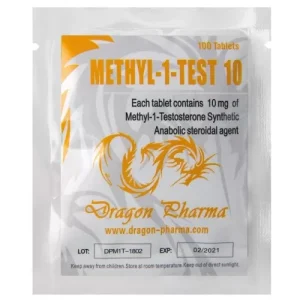 Buy Methyl-1-Test 10 -100 tabs by Dragon Pharma
Buy Methyl-1-Test 10 -100 tabs by Dragon Pharma
Alternatives to Creatine for Myostatin Inhibition
YK-11: A synthetic myostatin inhibitor derived from SARMs, offering more potent results but accompanied by more significant risks.
ACE-031: A peptide that directly inhibits myostatin, though it remains in experimental phases and is not legally approved in many regions.
Natural Alternatives
Follistatin-rich Foods: Eggs and dairy products may have natural myostatin-inhibiting properties.
Resistance Training: Intense and consistent weightlifting alone can naturally lower myostatin levels.
Where to Buy Creatine
Creatine is readily available worldwide. It can be purchased from:
Local Pharmacies and Nutrition Stores: Ideal for trusted and immediate access.
Online Platforms: Websites like Amazon, iHerb, or bodybuilding-specific stores offer a variety of brands and formulations.
Supplement Brands: Well-established brands such as Optimum Nutrition, MyProtein, and Cellucor often carry high-quality creatine.
Legality of Myostatin Inhibitors
Creatine: Creatine is completely legal and widely accepted as a dietary supplement.
YK-11 and ACE-031: These compounds exist in a legal gray area in many countries due to their experimental nature and potential risks. It's essential to research local laws before considering these options.
Best Stores and Suppliers
For reputable products, consider:
Transparent Labs: Known for purity and transparent labeling.
Optimum Nutrition: Offers pharmaceutical-grade creatine monohydrate.
Bulk Supplements: A great choice for bulk buyers seeking affordability and quality.
Our Advice to Bodybuilders
Always consult with a healthcare professional before starting any new supplement, especially if you are already using AAS or other advanced compounds.
Prioritize a balanced diet and consistent exercise routine. Supplements like creatine work best as part of a holistic approach to fitness.
Stay hydrated while using creatine to minimize water retention side effects and support kidney health.
Related Article: Best Syringes for Steroid Injection on Amazon
Overall
While creatine may not be as potent a myostatin inhibitor as advanced compounds like YK-11 or ACE-031, its affordability, safety, and accessibility make it a valuable addition to any bodybuilder's supplement stack. By leveraging its benefits alongside proper training and nutrition, you can maximize muscle growth and overcome plateaus, regardless of your fitness level.
Steroids
Raloxifene (Evista) 101: A Non-Surgical Solution for Gyno
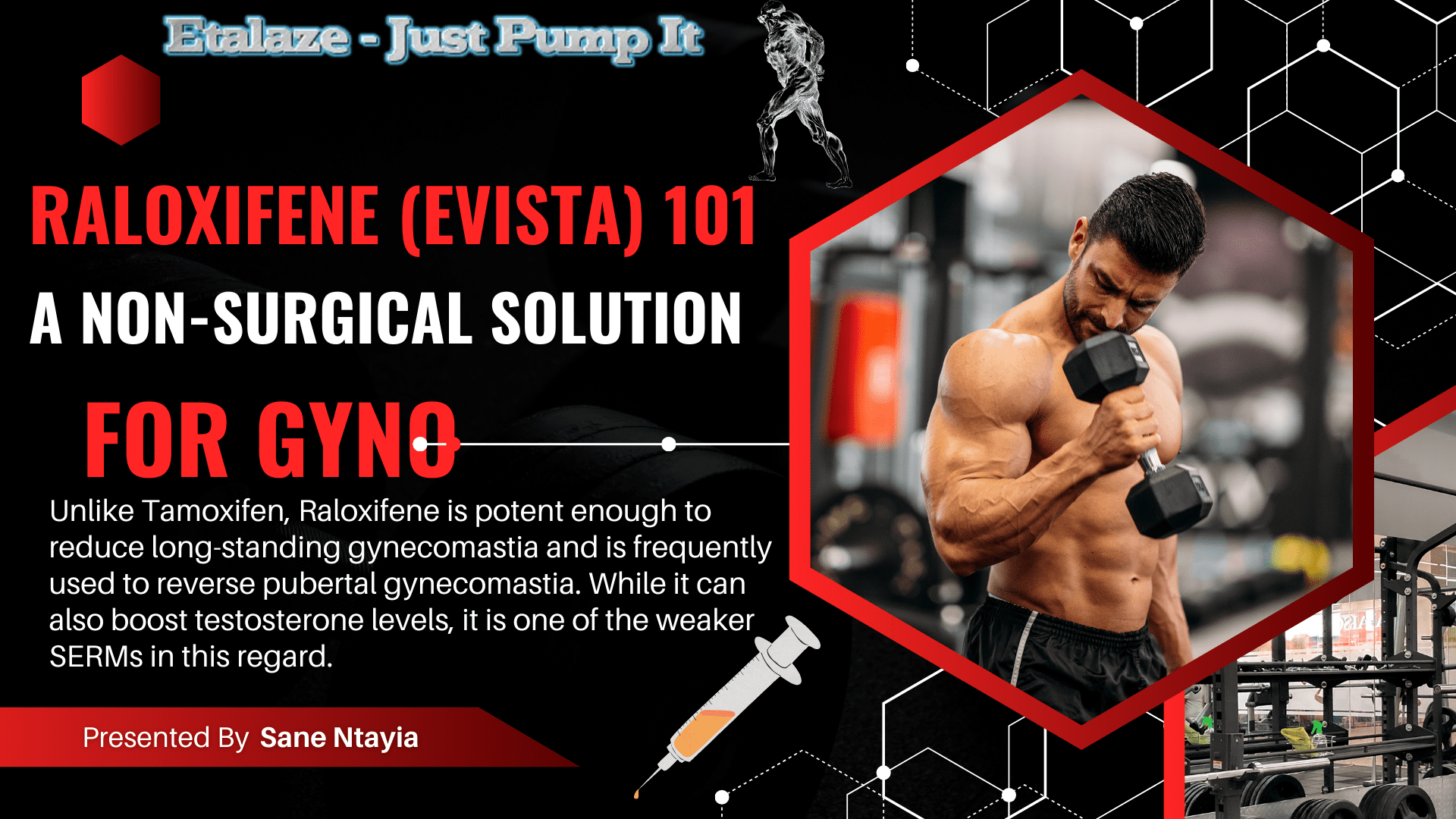
Raloxifene, a selective estrogen receptor modulator (SERM), is one of the most valuable yet less common options available today. Originally developed to prevent and treat breast cancer similar to Tamoxifen, it has gained popularity among bodybuilders seeking to prevent or eliminate gyno.
 Click Here to Buy Evimed 60 by Deus Medicals
Click Here to Buy Evimed 60 by Deus Medicals
Unlike Tamoxifen, Raloxifene is potent enough to reduce long-standing gynecomastia and is frequently used to reverse pubertal gynecomastia. While it can also boost testosterone levels, it is one of the weaker SERMs in this regard.
How it Works
Raloxifene functions by blocking estrogen receptors in the breasts, which helps prevent or treat both gynecomastia and breast cancer. Additionally, it blocks estrogen receptors in the hypothalamus, stimulating testosterone production.
Beyond these primary benefits, Raloxifene can enhance bone mass, combat osteoporosis, and lower cholesterol levels.
Potential Side Effects
While Raloxifene is considered a generally safe and effective medication, like all drugs, it comes with its own set of potential side effects. One of the most notable is the reduction in Insulin-like Growth Factor 1 (IGF-1) levels. IGF-1 plays a key role in muscle growth and repair, so decreased levels could potentially impact athletic performance or recovery.
However, compared to other medications in its class, Raloxifene has a relatively low risk of causing severe liver toxicity. Users are less likely to experience harmful effects such as blood clots, mood swings, or sexual dysfunction, making it a preferable choice for many.
While rare, some users might experience less serious side effects such as hot flashes, leg cramps, or flu-like symptoms. It's essential to consult with a healthcare professional to monitor any adverse reactions and ensure the medication is being used safely.
So, despite its efficacy, Raloxifene is not without side effects, but they are typically manageable and less severe compared to other SERMs.
Check Out Halotest 10 mg, Balkan Pharmaceuticals
For gyno reversal, the typical protocol involves taking 60mg daily for 1-2 weeks, followed by 30mg daily for up to 3 months or until the condition resolves.
Read More: Joint Stiffness on AAS, How to Manage It
Typical Protocol
For gynecomastia reversal, the typical protocol involves taking 60mg of Raloxifene per day for 1-2 weeks, followed by a reduced dose of 30mg per day for up to 3 months or until the gynecomastia is resolved. In post-cycle therapy (PCT), bodybuilders generally take 60mg per day for 4-6 weeks, and then lower the dose to 30mg per day during the last week. Raloxifene is highly effective for managing gynecomastia and supporting post-cycle recovery, making it a valuable addition to a well-optimized bodybuilding regimen.
Overall
Raloxifene (Evista) is a versatile SERM used to treat breast cancer and is popular among bodybuilders for managing gynecomastia (gyno). Unlike Tamoxifen, it effectively shrinks long-standing gyno and reverses pubertal gyno. It blocks estrogen receptors in the breast and hypothalamus, thus preventing gyno and promoting Testosterone secretion. Additionally, it improves bone mass, combats osteoporosis, and lowers cholesterol levels. For gyno, take 60mg/day for 1-2 weeks, then 30mg/day for up to 3 months. For post-cycle therapy (PCT), take 60mg/day for 4-6 weeks, then reduce to 30mg/day during the final week. This safe and effective medication has minimal side effects.
Bodybuilding
Mastering Bodybuilding in 2025: Top Fitness Tips for Success
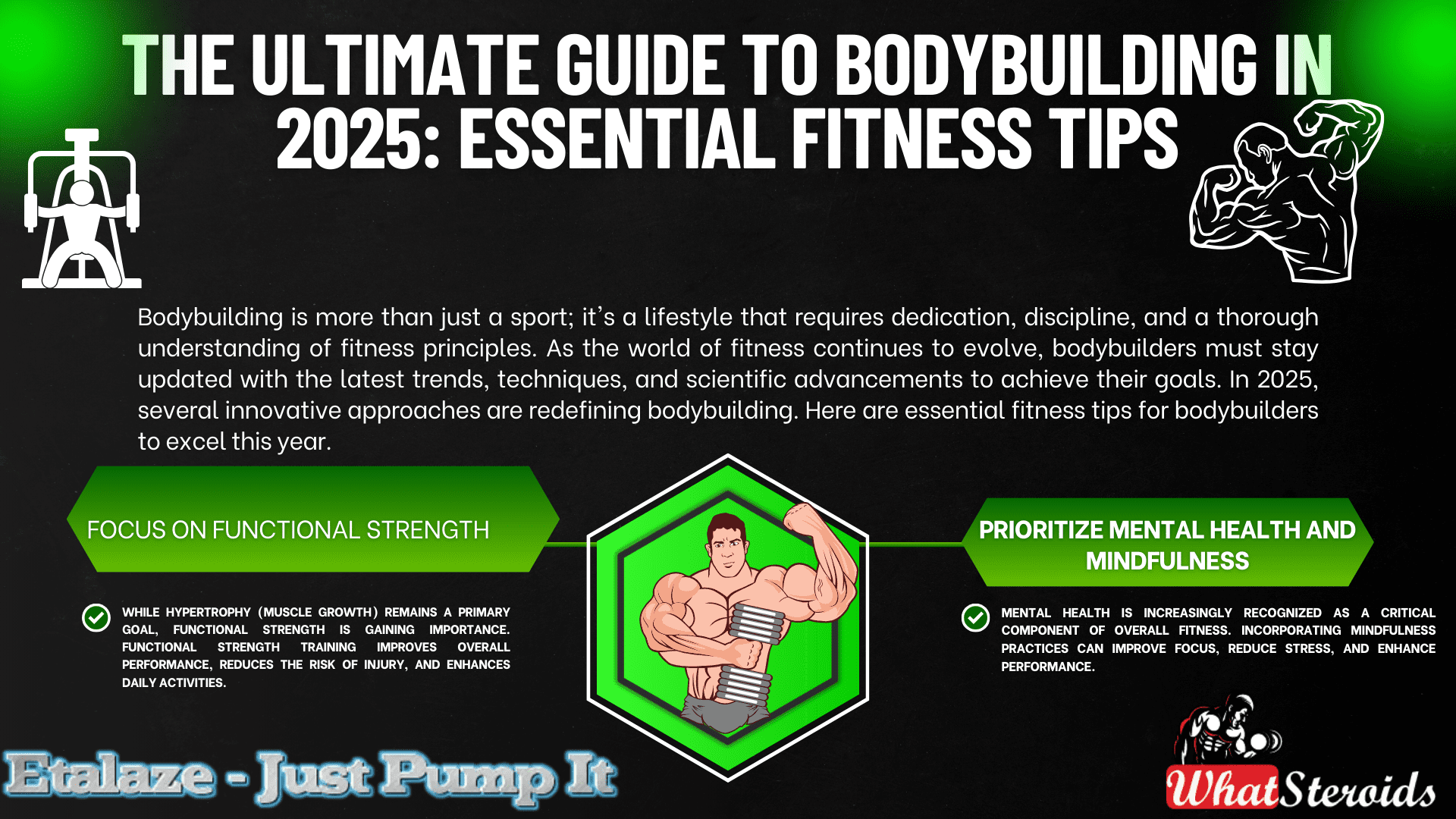
Bodybuilding is more than just a sport; it's a lifestyle that requires dedication, discipline, and a thorough understanding of fitness principles. As the world of fitness continues to evolve, bodybuilders must stay updated with the latest trends, techniques, and scientific advancements to achieve their goals. In 2025, several innovative approaches are redefining bodybuilding. Here are essential fitness tips for bodybuilders to excel this year.
Read More: Bodybuilder Winter Clothing: Staying Warm and Stylish
Embrace Technology-Driven Workouts
In 2025, technology plays a significant role in bodybuilding. Wearable devices, fitness apps, and virtual reality (VR) training are now integral components of an effective workout regimen.
Wearable Devices
Modern wearables track everything from heart rate and sleep patterns to muscle activation and caloric expenditure. Utilize these devices to monitor your progress and make data-driven adjustments to your training and nutrition plans.
Fitness Apps
Leverage fitness apps for customized workout plans, progress tracking, and virtual coaching. Many apps now incorporate artificial intelligence to provide personalized feedback and recommendations.
Virtual Reality Training
VR technology offers immersive workout experiences, allowing bodybuilders to simulate different training environments and scenarios. This can enhance motivation and add variety to your routine.
Focus on Functional Strength
While hypertrophy (muscle growth) remains a primary goal, functional strength is gaining importance. Functional strength training improves overall performance, reduces the risk of injury, and enhances daily activities.
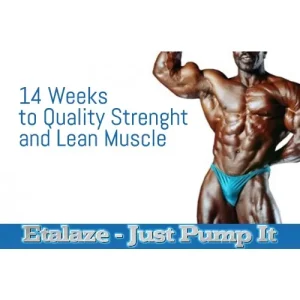 Check Out Our1 4 Weeks Quality Strength & Lean Muscles
Check Out Our1 4 Weeks Quality Strength & Lean Muscles
Compound Movements
Incorporate compound exercises like squats, deadlifts, and bench presses. These movements engage multiple muscle groups and joints, promoting balanced strength development.
Core Stability
Prioritize exercises that strengthen the core, such as planks, Russian twists, and leg raises. A strong core supports better lifting mechanics and reduces the risk of lower back injuries.
Optimize Nutrition for Muscle Growth and Recovery
Nutrition is the cornerstone of successful bodybuilding. In 2025, the focus is on personalized nutrition plans tailored to individual needs and goals.
Protein Intake
Ensure adequate protein intake to support muscle repair and growth. Aim for 1.6 to 2.2 grams of protein per kilogram of body weight per day, depending on your training intensity and goals.
 Click Here to Buy SynthaTrope By SynthaPharma
Click Here to Buy SynthaTrope By SynthaPharma
Nutrient Timing
Pay attention to nutrient timing to maximize muscle recovery and growth. Consume protein and carbohydrates within 30 minutes post-workout to replenish glycogen stores and kickstart muscle repair.
Supplements
Utilize supplements wisely. Creatine, branched-chain amino acids (BCAAs), and omega-3 fatty acids are popular choices for enhancing performance and recovery.
Prioritize Mental Health and Mindfulness
Mental health is increasingly recognized as a critical component of overall fitness. Incorporating mindfulness practices can improve focus, reduce stress, and enhance performance.
Meditation
Incorporate meditation into your daily routine to reduce stress and improve mental clarity. Mindfulness meditation can enhance your mind-muscle connection during workouts.
Visualization
Use visualization techniques to mentally rehearse your workouts. Visualizing successful lifts and achieving your goals can boost confidence and motivation.
Rest and Recovery
Prioritize rest and recovery to prevent burnout and overtraining. Ensure you get 7-9 hours of sleep per night and incorporate rest days into your training schedule.
Leverage Advanced Training Techniques
Advanced training techniques can help break through plateaus and stimulate muscle growth. In 2025, several methods are gaining popularity among bodybuilders.
Blood Flow Restriction (BFR) Training: BFR involves restricting blood flow to the muscles during low-intensity exercises. This technique can enhance muscle growth and strength without the need for heavy weights.
Eccentric Training: Focus on the eccentric (lowering) phase of exercises. Eccentric training can stimulate greater muscle damage and growth compared to traditional concentric movements.
Periodization: Implement periodization into your training plan. Varying the intensity, volume, and type of exercises can prevent plateaus and ensure continuous progress.
Incorporate Recovery and Mobility Work
Recovery and mobility are essential for preventing injuries and maintaining optimal performance. In 2025, bodybuilders are paying more attention to these aspects of training.
Foam Rolling and Myofascial Release: Use foam rollers and massage balls to release muscle tightness and improve flexibility. Regular myofascial release can reduce soreness and enhance recovery.
Stretching: Incorporate dynamic stretching before workouts and static stretching after workouts. Stretching improves range of motion and prevents muscle imbalances.
Cryotherapy and Hydrotherapy: Explore recovery techniques like cryotherapy (cold therapy) and hydrotherapy (water therapy) to reduce inflammation and accelerate muscle recovery.
Engage in Continuous Learning and Community Building
The fitness industry is constantly evolving, and staying informed is crucial for success. Engage in continuous learning and connect with the bodybuilding community for support and motivation.
Educational Resources: Read books, watch videos, and attend seminars to stay updated on the latest research and trends in bodybuilding.
Community Engagement: Join online forums, social media groups, and local bodybuilding clubs. Sharing experiences and knowledge with fellow bodybuilders can provide valuable insights and encouragement.
Professional Guidance: Consider working with a certified personal trainer or coach. Professional guidance can help you optimize your training and nutrition plans, ensuring you're on the right track.
With your FB Plus subscription or active FB Plus Pass, you now have access to 124 weeks of our most popular workout programs, which typically sell for $10-$30 each. Additionally, our popular 4-week Meal Plan is included. This is on top of the 38 Challenges and Programs that are already available to Plus members.
We've also introduced a new feature that many of you have requested. To assist you in choosing your next program, you can now preview each day of any program from its detail view. This feature lets you see all the included workout videos and content before you schedule it, ensuring you know exactly what to expect.
Conclusion
In 2025, bodybuilding is more than just lifting weights; it's a holistic approach to fitness that encompasses technology, nutrition, mental health, and advanced training techniques. By embracing these fitness tips, bodybuilders can achieve their goals, stay injury-free, and enjoy a fulfilling fitness journey. Remember, consistency and dedication are key to success in bodybuilding. Stay committed, keep learning, and most importantly, have fun on your path to becoming the best version of yourself.
-

 Steroids2 years ago
Steroids2 years agoVOX Testing: Why Bodybuilders Must Have It Tested Regularly
-

 Steroids2 years ago
Steroids2 years agoShavers and Other Body Grooming Equipment for Bodybuilders In 2023
-

 Steroids2 years ago
Steroids2 years agoChatGPT and Other Avenues to Find Great Bodybuilding Coaches
-
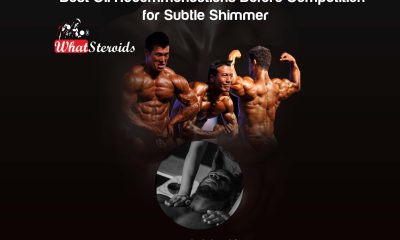
 Steroids2 years ago
Steroids2 years agoBest Oil Recommendations Before Competition for Subtle Shimmer
-
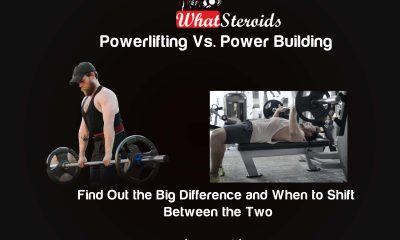
 Steroids2 years ago
Steroids2 years agoPowerlifting Vs Power Building: Find Out the Big Difference and When to Shift Between the Two
-

 Nutrition1 year ago
Nutrition1 year agoEverything Nutritional Food: What’s Too Much Or Too Little
-

 Anabolic Steroids1 year ago
Anabolic Steroids1 year agoLegality of Anabolic Steroids In Latin America
-

 Bodybuilding Products12 months ago
Bodybuilding Products12 months agoTelmisartan In Bodybuilding: An Expert’s Advice
-

 Beginners2 years ago
Beginners2 years agoTren Cycle for Beginners
-
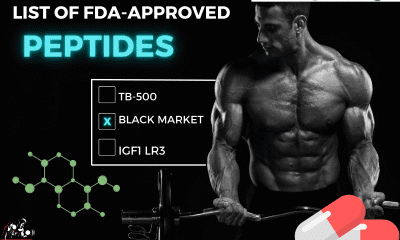
 Bodybuilding1 year ago
Bodybuilding1 year agoList of FDA-Approved Peptides
-
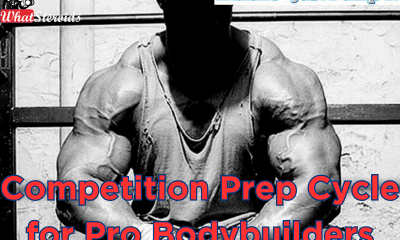
 Bodybuilding2 years ago
Bodybuilding2 years agoCompetition Prep Cycle for Pro Bodybuilders
-

 Bodybuilding1 year ago
Bodybuilding1 year agoChia Seeds in A Bodybuilder’s Diet: An Expert’s Advice
-

 Anabolic Steroids11 months ago
Anabolic Steroids11 months agoHow Much Do You Know About B-AET? A Fat Burner You’ve Been Missing
-
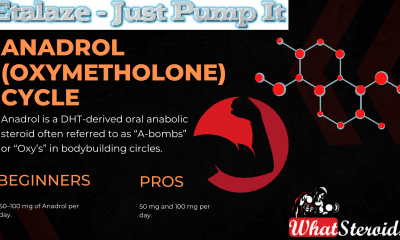
 Steroids11 months ago
Steroids11 months agoAnadrol Cycle: Benefits, Doses, Alternatives, etc.
-
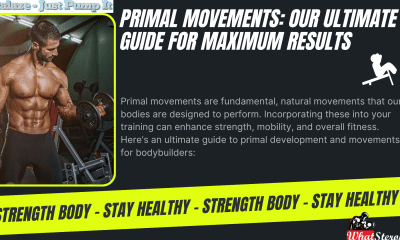
 Bodybuilding7 months ago
Bodybuilding7 months agoPrimal Movements: Our Ultimate Guide for Maximum Results
-
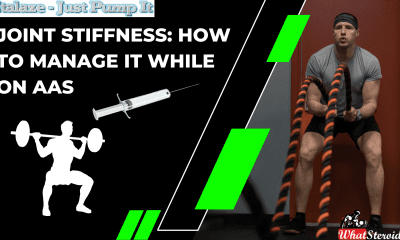
 Anabolic Steroids8 months ago
Anabolic Steroids8 months agoJoint Stiffness: How to Manage It While on AAS
-

 Product Reviews10 months ago
Product Reviews10 months agoTop Vitamins for Skin Health
-
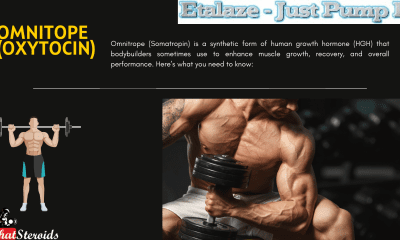
 Steroids9 months ago
Steroids9 months agoOmnitope (Oxytocin)
-
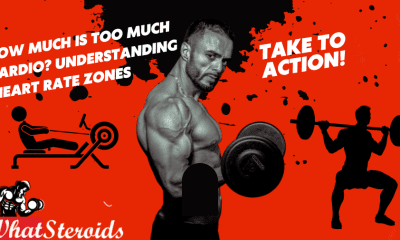
 Bodybuilding1 year ago
Bodybuilding1 year agoHow Much Is Too Much Cardio? Understanding Heart Rate Zones
-
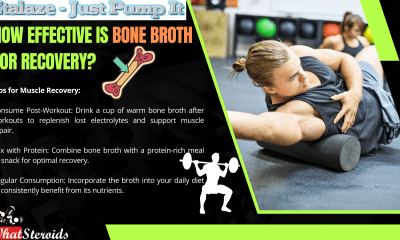
 Bodybuilding8 months ago
Bodybuilding8 months agoHow Effective is Bone Broth for Recovery?
-
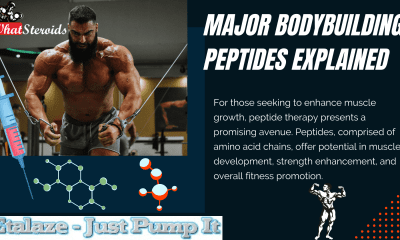
 Steroids10 months ago
Steroids10 months agoMajor Bodybuilding Peptides Explained
-
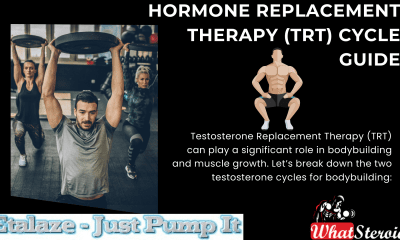
 Bodybuilding9 months ago
Bodybuilding9 months agoHormone Replacement Therapy (TRT) Cycle Guide
-
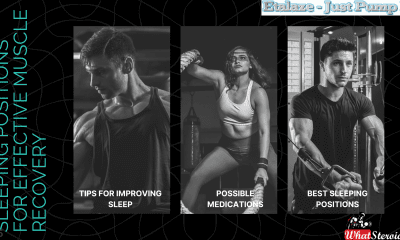
 Steroids8 months ago
Steroids8 months agoSleeping Positions for Effective Muscle Recovery
-

 Anabolic Steroids1 year ago
Anabolic Steroids1 year agoStart The New Year Strong With These Tips
-
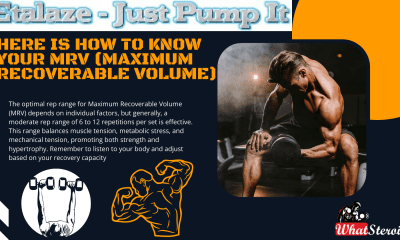
 Bodybuilding10 months ago
Bodybuilding10 months agoHere Is How To know Your MRV (Maximum Recoverable Volume)


